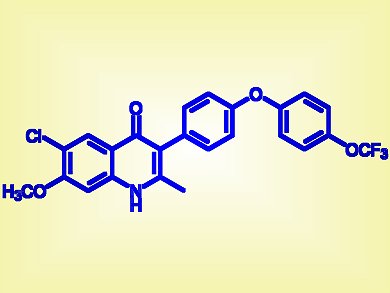Malaria is a severe infection caused by the Plasmodium parasite. This disease is characterized by a first asymptomatic liver stage, during which the Plasmodium reproduces in hepatic cells, and a second symptomatic stage, during which the parasite replicates within blood cells. Nevertheless, most antimalaric treatments, such as the naphthoquinone atovaquone, target only the blood phase of the disease and they are not effective against drug resistant parasite strains.
Aaron Nielsen, Veterans Affair Medical Center, Portland, USA and colleagues demonstrated that a new drug, ELQ-300 (pictured), offers a way around these issues. The novel compound, a 4(1H)-quinolone bearing a diarylether side chain in the quinolone core, blocks both the blood and the liver stage infection and acts against atovaquone-resistant strains of Plasmodium Palciparum. ELQ-300, moreover, shows high metabolic activity and oral efficacy, thus representing a promising antimalarial drug.
- Quinolone-3-diarylethers: a new class of antimalarial drug,
A. Nilsen, A. N. Lacrue, K. L. White, I. P. Forquer, R. M. Cross, et al.,
Sci. Transl. Med. 2013, 177, 177ra37.
DOI: 10.1126/scitranslmed.3005029



